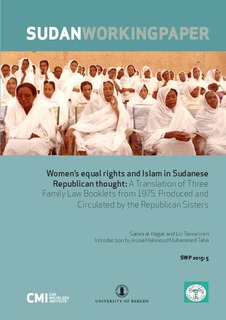Women’s Equal Rights and Islam in Sudanese Republican Thought: A Translation of Three Family Law Booklets from 1975, Produced and Circulated by the Republican Sisters
Working paper
Permanent lenke
http://hdl.handle.net/11250/2475416Utgivelsesdato
2015-08-01Metadata
Vis full innførselSamlinger
- Publications [1488]
Originalversjon
Bergen: Chr. Michelsen Institute (Sudan Working Paper no. SWP 2015:5) 28 p.Sammendrag
This paper includes a translation of three booklets produced by the Sudanese Republican Sisters in commemoration of International Women’s Day in 1975: (i) Women Rights in the Constitution and under Sudanese Sharia Laws , (i) Divorce Is Not an Original Precept in Islam , and (iii) Polygamy Is Not a Principle of Islam. The booklets give insights into radical views on women’s equal rights in Islam long before the term “Islamic feminism” started to circulate. The booklets tackle contested issues within the realm of women’s rights and Islam related to marriage, divorce, and polygamy. At the time of the booklets, women’s rights within the family were dealt with according to judicial circulars developed by the religious clergy. It was not until 1991 that the Sudanese state introduced a codified Muslim family law or personal status law. According to the Republican Brothers, these judicial circulars regulating women’s civil rights contradicted the 1973 constitution, which guaranteed equality before the law, because they (among other things) allowed polygamy and stipulated a wife’s obedience to her husband. In 1975, when Republicans circulated these booklets, Sudan’s women’s movement was more busy advocating equal pay for equal work than demanding equal rights within the private sphere of the family. The mobilization for equality in the family during the 1970s was left solely to the Republican Brothers and Sisters. In fact, in 1975 these groups made a plea to the feminist movement to address the stark gender inequalities within Sudanese family law. The booklets translated in this publication were used by the Republican Sisters during the 1970s to share a feminist interpretation of Islam and to contribute to the transformation of Muslim women in Sudan. The booklets were used as educational material for mobilizing women to resist gender inequality and injustice in the name of Sharia.
